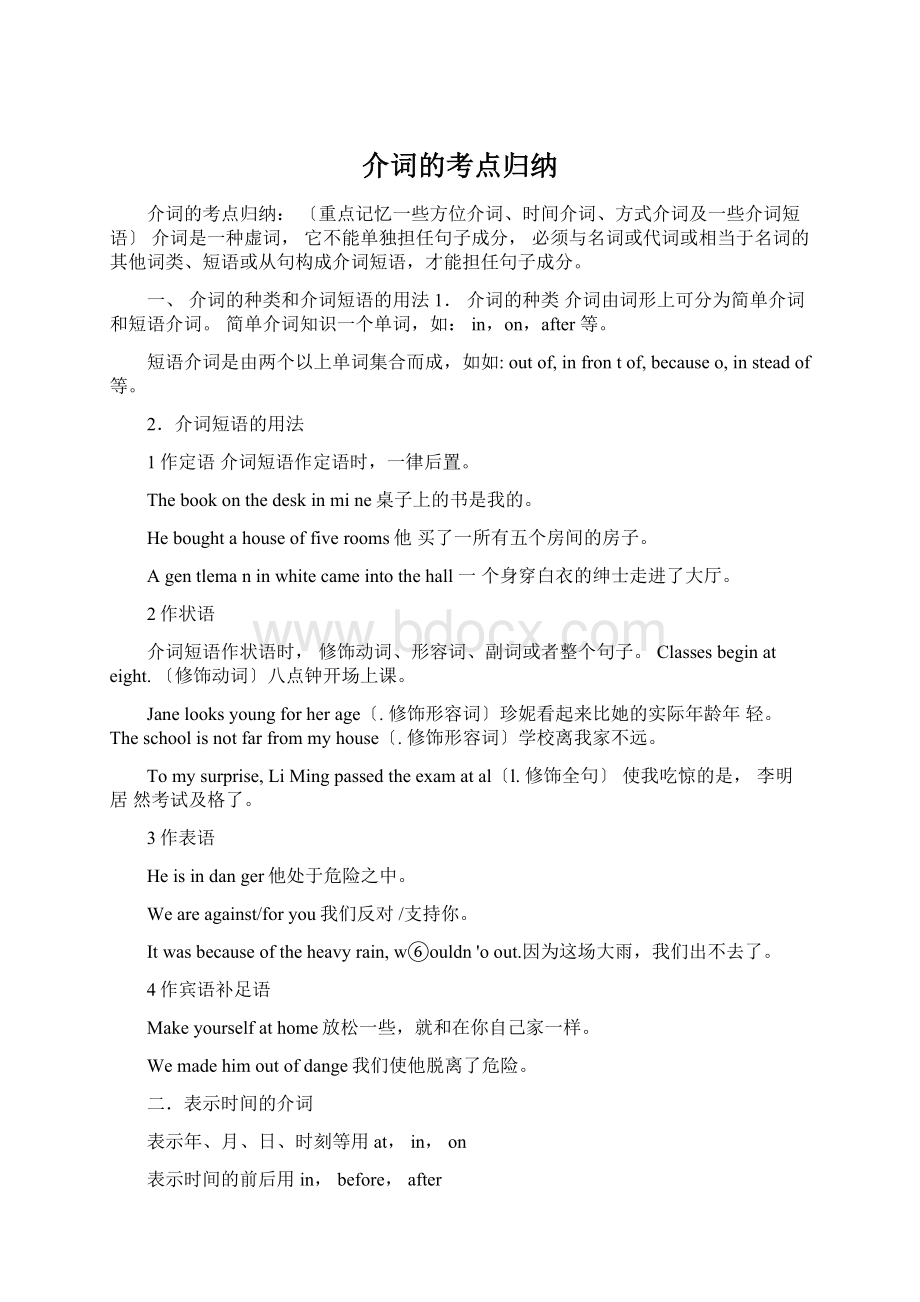介词的考点归纳.docx
《介词的考点归纳.docx》由会员分享,可在线阅读,更多相关《介词的考点归纳.docx(14页珍藏版)》请在冰豆网上搜索。

介词的考点归纳
介词的考点归纳:
〔重点记忆一些方位介词、时间介词、方式介词及一些介词短语〕介词是一种虚词,它不能单独担任句子成分,必须与名词或代词或相当于名词的其他词类、短语或从句构成介词短语,才能担任句子成分。
一、介词的种类和介词短语的用法1.介词的种类介词由词形上可分为简单介词和短语介词。
简单介词知识一个单词,如:
in,on,after等。
短语介词是由两个以上单词集合而成,如如:
outof,infrontof,becauseo,insteadof等。
2.介词短语的用法
1作定语介词短语作定语时,一律后置。
Thebookonthedeskinmine桌子上的书是我的。
Heboughtahouseoffiverooms他买了一所有五个房间的房子。
Agentlemaninwhitecameintothehall一个身穿白衣的绅士走进了大厅。
2作状语
介词短语作状语时,修饰动词、形容词、副词或者整个句子。
Classesbeginateight.〔修饰动词〕八点钟开场上课。
Janelooksyoungforherage〔.修饰形容词〕珍妮看起来比她的实际年龄年轻。
Theschoolisnotfarfrommyhouse〔.修饰形容词〕学校离我家不远。
Tomysurprise,LiMingpassedtheexamatal〔l.修饰全句〕使我吃惊的是,李明居然考试及格了。
3作表语
Heisindanger他处于危险之中。
Weareagainst/foryou我们反对/支持你。
Itwasbecauseoftheheavyrain,w⑥ouldn'oout.因为这场大雨,我们出不去了。
4作宾语补足语
Makeyourselfathome放松一些,就和在你自己家一样。
Wemadehimoutofdange我们使他脱离了危险。
二.表示时间的介词
表示年、月、日、时刻等用at,in,on
表示时间的前后用in,before,after
表示期限等用by,until,till
表示期间等用for,during,through表示时间的起点等用from,since表示时间的经过等用in,within1.at、in、on用在时间上的区别:
A.at+钟点/时间点/时间某一时刻
(at9:
00,atlunch,atbreakfast,atnoon,atnight,atthattime,atthemoment)
B.in+某年/某月/某年某月/某个季节/某个世纪/泛指的早上/下午/晚上inthemorningintheafternoonintheeveninginthe21stcenturyinSeptember;inMayin1995intheholidayinsummer
C.on+日期/星期/具体的某一天/具体的某一天的上午、下午、晚上onMondayonTuesdaymorningonMay4thonacoldnightonasunnymorning
onthenightofJuly〔the〕first在七月一日的夜晚
注意:
表示时间的名词前有this,last,next,every等修饰时,其前面不加介词。
thismorning今天早上;lastMonday上周一;everyweek每周稳固练习:
选择用at、in、on填空:
2.2005
theafternoon
6.winter
the21stcentury
1.10:
40
3.June3,20214.
5.May,2021
7.Friday8.
9.ahotsummernight10.Saturdaymorning2.in、after、before用在时间上的区别:
A.in在后
in与将来时态连用时,表示“过多长时间以后〞的意思,后面跟表示一段时间的词语。
Hewillbebackintwomonths.
B.after在后
After与过去时态连用时,后面才能跟表示一段时间的词语。
After与将来时态连用时,后面只能跟表示时间点的词语。
Hewillarriveafterfouro'clock.
Hereturnedafteramonth.
ShewenttoNanjinglastMay,andshecamebackafteramonth.
C.before在前
Washyourhandsbeforedinner.
稳固练习:
选择用in、after填空:
1.HerfathercamebackfromFrancetwoyears.
2.MyparentswenttoShanghaiyesterdayandtheywillreturntoGuangzhouthreedays.
3.by,until/till区别
A.by在…前〔时间〕;截止〔到〕….
HowmanyEnglishbookshadyoureadbytheendoflastyear到去年年底以前你看过多少本英文书?
ShehadleftbythetimeIarrived我到时〔之前〕她已经走了。
例:
bytheendof在,,底〔之前〕bythen到那时bythetime+从句在,,之前
B.until/till直到…为止〔时间〕
Hedidn'tgotosleepuntil/till12lastnight.
Wedidn'btegintowatchTVuntil/tillnineo'clock.
,during,through区别
A.for达…之久〔表示经过了多少时间〕可以和一般现在时、过去时、将来时连用,但经常和完成时连用。
Hehaslivedherefor20years他在这儿已经住了二十年了。
Wewillstayinthecityfortwodays.我们要在这座城市呆两天。
B.during在…期间(后决不能跟表数字的名词)
theyaregoingtohaveagoodrestduringthesummerholiday暑假中他们打算好好休息一下。
C.through一直…〔从开场到完毕〕
Theyplayedthecardsthroughthenigh他们打了一整夜的牌。
HestayedinLondonthroughthewinter他整个冬天都待在伦敦。
5.from,since区别
A.from从…起〔时间〕表示从…开场"时,一般都是用词组from,to,,
Themeetingwillbeheldfromeighttoten这个会议将从8点开到10点。
B.since自从…以来〔表示从以前某时一直到现在仍在继续〕用于现在完成时后跟时间点
Ihavebeensicksinceyesterday.
TomhasplayedthepianosinceJanuary.
6.in,within
A.in过…后〔未来时间〕大多用在将来时〔一般将来时和过去将来时〕。
inanhour一小时之后
inaweekorso大约一星期之后
hewillbebackinfivehours.他五小时之后回来。
Theysaidtheywouldarrivehereinaweek他们说他们一周后到达。
B.within不超过…的范围强调“在,,时间之内〞,没有时态的限制
within3hours3小时之内;withinaweek—周之内Imustfinishpaintingthecatwithinfiveminutes.
三•表示方位介词
表示场所的介词:
at,in,on,under,over,below,near,between,around表示方向的介词:
into,outof,along,acrossthrough,up,past
1.at,in,on
at一般指小地方
atschool;athome;standatthedoo;atafactory;atthebusstopatthestation
in一般指大地方或某个范围之内
inBeijing;intheworld;inChina;inthestreet;inbed;intheyard
on往往表示在某个物体的外表〃。
onthedeskonthemap;onthescreenontheriver;onthefarm;onthefloor
稳固练习
HearrivedShanghaiyesterday.
Theyarrivedatavillagebeforedark.Thereisabigholethewall.
Theteacherputupapicturethewall.
2.on、above、over、below、under这些方位介词的区别:
on在上面〔与外表接触〕
Therearetwomapsonthewall.
above在……上面,表示在外表不接触的上方,不一定是正上方。
Ourplaneflewabovetheclouds.
over在……上面,表示外表不接触的上方,指垂直在上的正上方。
ThereisalightoverLiMing.
below在下面,指位置低于某物或在某物的下方,但不一定在某物的正下方,
其反义词是aboveo
Therearealotoffishesbelowthesurfaceofthewater.
under指在某物的正下方,有垂直在下的意思,其反义词是over。
Thedogisunderthetable.
稳固练习:
选择用on、above、over、below、under填空:
1.Theywillbuildanewbridgetherivernearourschool.
2.Becareful!
Asnakeislyingtheground!
3.Villages,rivers,lakesarebecomingsmallerandsmallertheplane.
4.Afterhegotup,hedidn'tfindhisshoesthebed.
5.Todayisaniceday.Youcanseeblueskyandwhitecloudsourheads.
3.along,cross,across,through,over,past,pass的用法区别:
along介词。
意思是沿着"Iwaswalkingalongtheriverwhenitbegantorain.cross动词。
意为越过、渡过、横穿、横渡"
(road,street,grass,river,bridge,dessert)
across介词。
表示从一边到另一边,在事物的外表横过"、越过"
(road,street,grass,river,bridge,dessert)
through介词。
表示从内部空间穿过"、通过"
(city,park,forest,window,door)
over介词。
意思是越过"。
从物体的一边到另一边
Thedogjumpsoverthefence.
Weclimboverthemountainatlast.
pass动词经过"〔门外经过〕
Ipassthepark
past介词经过〃〔门外经过〕
Everydayherunspastthecityhall.
Iwalkpastthepark.
稳固练习:
选择cross、across或through填空:
1.Thegirlhelpedtheoldmanwalktheroad.
2.Thechildrenwalkedthedooronebyoneintothecinema.
3.Thecarranthebridgeandturnedrightintoapark.
4.Abeautifulriverrunsourhometown.
5.Hecouldswimtheriverwhenhewasyoung.
6.Whenthesunshinewentthewindowintohisbedroom,hefinishedwritinghisbookintheend.
7.Don'tthebusystreetwhenthetrafficlightisred.
8.Sheaskedherlittlesonnottotheriverbecauseitwasraininghard.
9.Thedogranthegrass.
10.Theboyswamtheriver.
11.Theywalkedtheforest.
12.Ipushedthecrowds.
4.infrontof,inthefrontof区另S
infrontof表示在某人或某物的前面",在某个范围以外;inthefrontof表示在……的前部〃,在某个范围以内。
Therearesometalltreesinfrontofthebuilding.
Theteacherissittinginthefrontoftheclassroom.
稳固练习
1.Peterisme.
2.Thereisablackboardinthefrontofourclassroom.
3.Thereisalakeinfrontofourclassroom.
4.Theteacher'sdeskisinthefrontoftheclassroom.
5.between,among,around的区别:
A.between在两者之间
What'thediffereneebetweenAandB?
MyteacherissittingbetweenTomandMike.
B.among后接人或物必须是三个或三个以上,在一群、一组或一个整体中间。
Thereisabeautifulhouseamongthetrees.
Heisverypopularamongthestudents.
C.around环绕,在…周围,在…四周
Wesataroundthetable.
稳固练习:
选择between,among,around填空:
1.MissLialwaysstandsthestudentsandteachesthemhowtolearnEnglish.
2.WewatchedafootballmatchJapanandChinayesterday.
3.Sheisagirlwithfewwordsherclassmates.
4.Isawhimstandingthepeopleandsangsongsforthem.
5.ThemanhastoflyGuangzhouandShanghai.
6.Thereisalowwallthetworooms.
7.Theearthmovesthesun.
8.Therearemanytreesthehouse.
四、其他介词
1.表示手段和材料的介词with,in,by
A.in+语言/墨水/颜色/声调用in时,后面加物质名词,不能加冠词。
Shewrotealetterinblackink.
Don'writeitinpencilbutinink.
CanyouspeakinEnglish?
B.with+工具用〔工具〕用“with'时,后面的名词要加上冠词或代词。
LiLicutherhandwithaknife.
Hewrotetheletterwithhisnewpen
C.by+方式用方式交通工具bycarbybus
★一些固定的用法,如:
inaway在某种程度上
ina+adj.+way以方式
inthis/thatway用这种/那种方式
intheway挡路
bytheway顺便问问
稳固练习:
选择介词in、by、with填空:
1.Don'ttalktotheoldmanthisway.
2.Helikesdrawingpicturesapencil.
3.theway,couldyoutellmehowIcangettothezoo?
4.WecanimproveourEnglishlisteningtosomeEnglishradio
programmes.
5.Hetoldhershecouldworkouttheproblemacleverway
6.ShewasaskedtosingasongEnglish.
2.except/exceptfor/besides的区别
A.except除了……之外〃〔同一类别比拟,但排除在外,后跟短语、从句〕
B.exceptfor除了“之外"〔不同类别比拟,排除在外〕
C.besides“除了……之外还有〞〔包括在内,起强调作用,用法近似aswellas〕
稳固练习:
用介词except/exceptfor/besides填空:
1.Iwanttobuysomefood,somedrinkssomesmallpresentsforthe
comingChildren'sDay.
2.EveryoneishereaboycalledJim.
3.AllofourstudentsPetercanworkoutthisproblemthoughPeterisweak
inmath.
4.Thereisnothingintheboxaletter.
5.Hisarticleisverygoodafewspellingmistakes.
五、介词短语
介词和动词、形容词或名词相结合后,形成复合词,有特定的意思。
如下:
1.动词+介词
lookup查看,查〔字典〕;lookat注视;lookfor寻找playwithsth.玩某物〔玩耍〕;thinkof想起,想到;hearfromsb收到某人的信;talkaboutsth谈论某事;
talkto/withsb.和某人谈论;listento倾听callonsb拜访某人;arriveat/in到达;takecareof照顾;waitfor等待;agreewith同意(某人)arriveat(in)至U达;askfor询问;begin…with从开场;believein相信;breakinto闯入;breakoff打断;
breakout爆发;breakup关系破裂;bringdown降低;bringin弓I进;bringup教育,培养buildup建立;callback回;callfor要求约请;callin召来;callon拜访访问;carefor喜欢;carryon继续开展;carryout实行开展;checkout查明结帐;clearup整理,收拾;comeabout发生,产生comeacross(偶然)遇见;
comeout出来;cometo共计至U达;compare…with与比拟;compareto比
作;cutoff切断;dependon依靠;dreamof梦想;falloff下降;fallover跌倒;getthrough通过;givein让步,屈服;giveout分发;giveup放弃;goabroad出国;gothrough浏览growup生长;hearabout听说;leadto导致liveon靠……为生;lookdownupon看不起;lookforwardto盼望;lookout留神;look(a)round仔细查看;setup建立;showoff炫耀;shutup住口;speedup加速;stickto坚持;thinkof考虑,想起;tryout试验;turndown调低;turnoff关掉;worryabout担忧
2.Be动词+形容词+介词
bekindto对〔某人〕亲切;begoodat在,,做得好;擅长于;belatefor迟到;beafraidof害怕;besorryforsth为,,抱歉;beabsentfrom缺席;beproudof以…为自豪;befoundof喜欢;befullof充满beinterestedin对…有兴趣;beconfidentin对…有信心;beshortof缺乏;betiredof厌恶;beproudof对…感到骄傲beworriedabout为…担